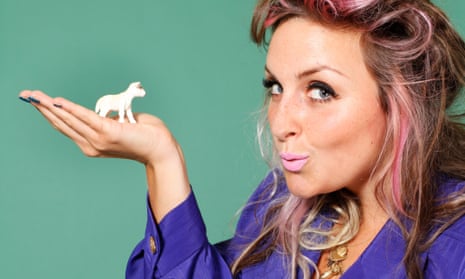I always read loads of poetry books when I was little, picture books like The Gruffalo, and I loved them. I love writing my own poetry now, but where can I find books for my in- between age of 10? I’m too old for little kids’ poetry and not quite old enough for teen poems and adult. I don’t need them to be that funny, but I do like them to rhyme if possible because that’s the poetry I like to write. And I want them to be about what I care about, especially friends.
From birth onwards, any child lucky enough to be read to will have heard a lot of poetry. Nursery rhymes and picture books with rhyming texts are all poetry which makes them perfect for reading aloud.
Following the inner tunes of verse helps the reader to make their reading aloud dramatic and fun – so it is no surprise that the listener loves it too.
Later on, when it gets to school and being examined on poetry, many teachers and pupils alike get nervous about how well they understand it and whether they really “get it”. Luckily, at the stage you are at, there is a lot of poetry to enjoy including novels written in verse, which have a special magic all of their own.
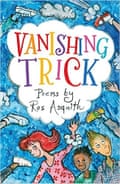
Ros Asquith’s Vanishing Trick is a collection of poems that will satisfy any reader looking for a range of poems but especially if, like you, they like poems about things that they can care about. These include things that happen at school including the simple Adams, a poem about the number of boys called Adam in one class; the heartrending DyslexiaaAAAARGH which, written as by a child with dyslexia, gives a vivid picture of the horrible chaos that letters and words can create for a reader; and the finely observed Year Six Disco. Out of school there’s Black & White, a lively but thoughtful look at differences and why they shouldn’t matter, and Alone, which captures that need for privacy that everyone feels from time to time. The addition of Ros Asquith’s own illustrations adds to the pleasure this collection gives.
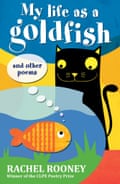
Rachel Rooney won the CLPE Poetry Award for The Language of Cat and her new anthology, My Life as a Goldfish and other poems, illustrated by Ellie Jenkins, is full of new and equally pleasing poems. There is a delightfully light touch to poems such as the title poem and a delicious interplay of stories in Wolf Play, which touches on the interaction of Little Red Riding Hood and the Wolf.
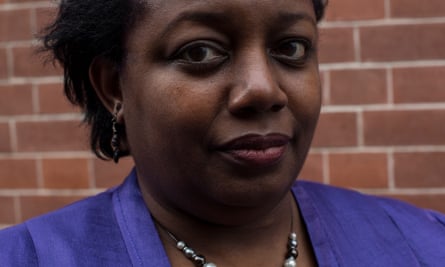
In addition to poetry anthologies, there are novels for your age group actually written in verse. A brilliant example is former Children’s Laureate Malorie Blackman’s Cloud Busting. As well as being written in verse, Cloud Busting is also a story about poetry which begins when the teacher asks the class to write a poem.
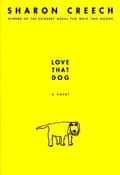
In a deeply moving story, Malorie Blackman writes about the gradual coming together as friends of Sam and Davy and how that friendship is destroyed by secrets, the betrayal of trust and falling out. Malorie Blackman uses different poetic styles for different chapters which enables her to capture the different moods of story brilliantly.
Sharon Creech was shortlisted for the Carnegie medal for Love that Dog, another story which is also about poetry as well as being written in verse. Love That Dog is written in diary form and in verse by Jack, who has a pretty negative view of poetry: “I don’t want to/ because boys don’t/ write poetry./ Girls do.”
Can Jack be persuaded that boys can and do write poetry? Sharon Creech followed the anthology up with Hate That Cat, which is written in the same way.
Laura Dockrill’s loveable Darcy Burdock, star of her own books, loves “seeing the extraordinary in the everyday and the wonder in the world around me’” Darcy expresses herself in all kinds of writing including poetry. She writes a poem What Makes You for her sister Poppy but, as she says, it is really a poem for anyone who is feeling a bit glum: “So you have an upturned nose,/ (Not even a little one either,/ like a real pig snout)/ But, without a doubt / You are the best to have fun with.” You can listen to Laura reading this poem in our podcast!
There are no rhymes in Sarah Crossan’s One but her telling of this story in blank verse is brilliant and profoundly affecting. The story of conjoined twins Grace and Tippi begins with the poem Sisters “Here/ We Are./ And we are living./Isn’t that amazing?/ How we manage / to be/ at all.” The rest of the story of their lives, which includes facing up to an operation that will enable them to live separately, is told in a succession of similar poems. Through them, each of the sisters is given a voice with which to describe their feelings and their experiences. The result is a book in which the reader feels right inside the head of the characters in a most remarkable way.
Whether it is in a collection of poems in an anthology or in the long narrative of a whole book, poetry is such an effective way of telling stories. Let’s have some more of it for all ages!
Which poetry books do you love, for all ages? Tell us on Twitter @GdnChildrensBks and by email childrens.books@theguardian.com and we’ll add them to this blog!
Here’s a round up of everything we’re doing this poetry-themed week!
Your poetry recommendations
@GuardianBooks @GdnChildrensBks just y'day my 12 yo was reciting from & laughing out loud at Shel Silverstein's Where The Sidewalk Ends
— Stephen Byrne (@StephenGByrne) October 5, 2015
@GdnChildrensBks Horatius at the Bridge - Macauley
— Glynis Smith (@Glynis005) October 5, 2015
@GdnChildrensBks here's my favourite Shel Silverstein pic.twitter.com/kBXmDWMRl4
— Charlotte (@ellaboheme) October 5, 2015
@GdnChildrensBks Ogden Nash is perfect. And Michael Rosen, Christina Rossetti, A A Milne, all favourites in school and at home.
— Charlotte (@ellaboheme) October 5, 2015
@GdnChildrensBks Spike Milligan, Stanley Holloway monologues such as The Battle of Hastings always went down well.
— Barbara Earl (@barbaraearl17) October 5, 2015
@GdnChildrensBks @MichaelRosenYes, Ted Hughes, Miroslav Holub, Carol Ann Duffy and loads more!
— Anne Reyersbach (@AynieLR) October 5, 2015
What's the best poetry for children? http://t.co/VheJ6ypvuY I'm rather fond of @mooseandmouse's new Never Nudge a Budgie @GdnChildrensBks
— Zoe Toft (@playbythebook) October 5, 2015
@GdnChildrensBks The Greatest Treasure Early rhymes to 1st school crush & loss of a pet, for children to age 10ish http://t.co/FU8ACRiYjn
— R L Puxty (@RLPuxty) October 5, 2015
@GuardianBooks @GdnChildrensBks And why are there no YA poetry collections? Poetry seems to end when you're 10 - and resume for adults.
— Rachel Rooney (@rooneyrachel) October 5, 2015
@rooneyrachel @GdnChildrensBks @GuardianBooks Butting in...there used to be ! Philip Gross MANIFOLD MANOR & Norman Silver....forget name!
— adele geras (@adelegeras) October 5, 2015
@GdnChildrensBks my vote is for the brilliant @JohnHegley What's the best poetry for children? http://t.co/YJwxItyG55
— Hannah Kohler (@hannahkohler) October 6, 2015
.@GdnChildrensBks, what about @TheEmmaPress 'Falling Out of the Sky'?Poems about myths for kids 9-12, ft @Poetryjoe! http://t.co/bIUD92smxI
— Richard O'Brien (@notrockyhorror) October 6, 2015
@hannahkohler @gdnchildrensbks @johnhegley @stokeylitfest Allan Ahlberg always! #eachpeachpearplum
— Hanna (@bestofallhans) October 6, 2015
